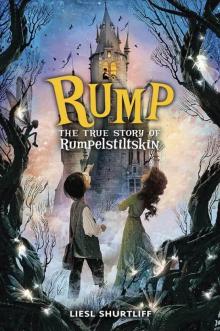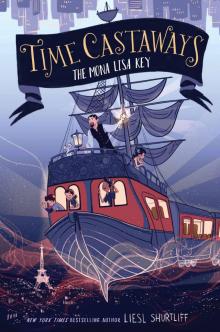- Home
- Liesl Shurtliff
Time Castaways #2
Time Castaways #2 Read online
Dedication
For Mom, who taught me perseverance.
And for Dad, who taught.
Contents
Cover
Title Page
Dedication
1. The Disappearing Thief
2. Doppelgänger
3. Tinkering
4. Spying
5. Birthday Surprises
6. Retro-Mom
7. Explanations
8. Signs and Symbols
9. Driver’s Ed
10. New Crew, Old Crew
11. Fatoumata
12. The Aeternum
13. Impasse
14. As It Always Should Have Been
15. Fingerprints
16. Past Faults
17. Sure Shot
18. Quine’s Letter
19. Forged
20. The Real Inventor
21. The Future Awaits
22. Family Ties
23. The Sacrifice
24. The Beginning
Acknowledgments
About the Author
Books by Liesl Shurtliff
Copyright
About the Publisher
1
The Disappearing Thief
Belamie, Age 5–15
1762–1772
Asilah, Morocco
It was a perfect day. At least in the beginning.
It began with blue skies, not a cloud in sight, and a calm, glassy sea.
No one understood where the storm came from, not even the old fortune-teller, who for decades had been a reliable source for most impending tragedies and doom. Stories abounded of course, as people will always search for answers and reasons. Perhaps some thoughtless sailor had whistled in the wind or stirred his tea with a knife, or maybe an ignorant passenger on a ship had unwittingly cut their nails. Reason or not, the storm blew in, quick and relentless.
The clouds rolled and rumbled into a dark foreboding mass. The first lightning bolt struck just before midday. The wind grew savage and the rain burst from the sky, pelting the water like a thousand arrows every second. The waves swelled to the size of small mountains, rising up and slapping down with brute, merciless force.
The little merchant ship did not stand a chance. The sailors did all they could, followed every order from their captain at the helm, but they knew there was no hope. In less than an hour the ship was sunk and every soul on board was drowned.
All but one.
A tiny girl, no more than five years old, miraculously survived the storm without so much as a scratch. She bobbed along the ocean in a small skiff, wearing only a thin nightgown, soaked and sticking to her like a second skin. The only other possession she had was a small dagger, which she held close to her chest like a talisman. She stared out at the water, now still and calm, as though waiting for something to rise from its depths.
A young sailor on a ship found the girl, floating among the wreckage. He spoke to her in English and then French, and when she didn’t respond either time he assumed she couldn’t understand him, but she could. The sailor argued with his companions over whether or not to rescue the girl. They seemed to be afraid of her for some reason. Perhaps they thought she had been the cause of the storm, that she would bring them bad luck. She had often heard sailors say that a female, even a little one, was bad luck on board a ship.
They left her in her skiff, lashed it to their ship, and tugged her all the way to the shores of Asilah, where the sunken ship had sailed from the day before. The girl did not speak or cry the entire way. She did not move.
When they had tugged the little skiff onto the beach, the sailors again argued over her, where they should take her, how she would survive. The girl didn’t even register their words. She only watched the waves, now calm and gentle, roll upon the shore.
The young sailor gave the girl what little food he had on him, some biscuits and dried fish. He gave her a final look of sympathy and left her on the beach, still sitting inside her little boat, clutching the dagger.
The girl’s name was Belamie Rubi Bonnaire. She knew her name as well as she knew that she was now alone in the world. Her parents were gone. Her papa, a French merchant with gentle hands, and her mama, a Moroccan beauty with a quick wit and captivating charm.
Though Belamie had been born in Morocco, her mother’s country, she had spent most of her life at sea, sailing the world with her parents and their crew. There was no one to take care of her now. She knew of no other family or friends, no one who cared or even knew of her existence. She once overheard a member of her papa’s crew say that her parents’ marriage had been a crime, that they’d been disowned by both their families and lived on the sea because no place else would have them. At the time Belamie thought that was just fine. She preferred the sea to land anyway, and she didn’t need anyone besides her parents. And now they were gone. They’d been swallowed by the angry sea, and they would not come back.
Belamie stayed with the boat. It was all she had left, and it would be her home and family now. She slept curled up inside of it that night, then sat in its shade all the next day. She didn’t leave the boat until her food was gone and survival instincts kicked in and forced her to get up and seek food and water.
Belamie determined she would not steal. Her religious education had been spotty and vague, but once, when they’d gone to Paris, Belamie had tried to steal a doll from the fancy shop where her father had been doing business. She’d tried to hide it behind her back, but her father had caught her and gave her a long lecture. Stealing was a sin, he had said. It might bring some fleeting pleasure, but then damnation and hellfire. Her mother told her that those who steal get their hands cut off. This frightened Belamie so much she vowed to never steal again. But after a week of eating little more than the dust kicked in her mouth by unsympathetic passersby, she decided a radical change was in order. Damnation be damned, it was steal or starve.
It was painful at first. She got a stomachache after eating her first stolen melon, but eventually she developed a callus on her conscience, and it got easier. By the age of ten she wasn’t ashamed to admit she found thieving to be quite fun, though she was always cautious. She learned it was best to steal from foreigners. Not only was it easier, it was safer too. The guards and soldiers were not concerned with protecting visitors. Even if she were caught, she’d likely only be made to give back what she’d stolen, perhaps spend a night or two in jail. That was far preferable to getting her hands chopped off. She’d seen it happen to thieves younger than her. She didn’t relish the idea of eating like a dog.
Day after day, year after year, she carved out a meager existence as a thief. She slept and ate and lived in her little boat on the beach. Occasionally thieves tried to steal her boat, but Belamie had her dagger and, despite her smallness, she was alarmingly dexterous and skilled with a blade. Thieves soon learned to leave her and her little boat alone, and Belamie was quite content to remain alone, a petty thief until the end of her days. But fate, as it seemed, had other ideas, as it often does.
She was about fifteen when the strange man who would change the course of her life came to Asilah. The whole village was talking about him. The guard keeping watch from the ramparts (the great white wall that bordered the city along the sea) reported that he’d appeared on the beach out of thin air. They all swore it was true.
The man was a spirit, everyone said. One of the mysterious and powerful jinn. Some said he was a good jinni come to grant wishes. Others said he was evil, come to possess their spirits. Good or evil, there was one thing everyone could agree upon. The man was rich as a king. Gold and silver seemed to flow from his fingers.
That got Belamie’s attention more than anything. She had little interest in the jinn, good or evi
l. Even if they were real, they would not fill her belly. But gold and silver could, and Belamie could steal from anyone.
She found him the next market day. He stood out like a fish on land. He was very different, even from all the sailors and foreigners she saw year after year. Belamie could not confidently discern where he was from. He wore loose trousers and a shirt with many buttons, and nothing around his neck. His head was bare, revealing dark hair streaked with silver. His back was to her, so she couldn’t see his face.
Belamie moved a little closer, just enough to hear the man speak. She’d know where he was from based on his accent. She’d traveled the world with her parents before they’d died, and after so many years stealing from foreigners she could accurately detect most accents.
“Would you like some cinnamon, sir?” said the merchant. “There is no better cinnamon in the world.” He held out a tiny sack, clearly eager to get some of the foreigner’s famed gold.
“Oh, I don’t know about that,” said the foreigner. “I’ve had some delicious cinnamon in Brazil, but the cinnamon in Sri Lanka is very nice as well, though I suppose at this time it’s not Sri Lanka, but Ceylon? What year is this again? 1772? Yes, it should be Ceylon now.”
The merchant blinked at the man, still holding out the pouch of cinnamon. Belamie was utterly perplexed. The man spoke flawless Arabic, only the barest hint of an accent that she couldn’t quite detect. It seemed to alter every other word. At first she thought maybe he was French, then English, then Russian.
“Some people think Ceylon cinnamon is the only real cinnamon,” the man continued, “but then they probably haven’t traveled to India. There, the spices are so pungent you can taste them in the air. Unfortunately, you can taste other less savory things in the air as well, so I don’t recommend eating Indian air, but Indian cinnamon is divine.”
The merchant nodded, his brow furrowed. He looked as though he didn’t know whether to be impressed or offended by the man. “You have traveled very far, it seems. From what country do you hail?”
Belamie leaned in a little closer to hear.
“I don’t claim any particular country of origin,” the man replied. “I find such labels to be a bit confining and, quite frankly, misleading and unfair to everyone. If I say I’m a Spaniard, you’ll instantly think me clever but haughty. On the other hand, if I tell you that I’m French, you’ll find me an amiable fellow, but you won’t trust me an inch. And yet, if I tell you I’m English, you’ll think me a self-aggrandizing snob, though a fashionable one. But there is a real chance that all these things might be true, and so I prefer to give us both the benefit of the doubt and say I am from nowhere and everywhere. It’s more accurate anyway. I’ll take some cinnamon, since you say it is the best in the world.” He pulled a thick silver coin seemingly out of thin air. The merchant didn’t move. He stared, blank as a dead fish, until the strange man placed the coin on the table and took the cinnamon out of his hand. “I’ll compare your cinnamon to the others and let you know if it is the best, if you like, so you can claim the title with complete confidence. Or drop it altogether. I always like to be accurate. Good day!” He turned away from the spice merchant. He tossed the little sack of cinnamon in the air, tucked it in his pocket, and walked right past Belamie, who was so lost in studying the odd stranger she almost forgot what she was about. She was supposed to be robbing him. Who cared where the man was from!
Belamie picked her way through the crowd toward the man. He was almost to the chicken merchant. That was perfect.
Belamie moved quickly and with purpose. She was just behind the man now, and she slipped her hand into his pocket, when without any warning he stepped out of her path. Belamie pitched forward, crashing into the stacked crates of chickens. The crates toppled onto her. The chickens exploded in angry squawks and a cloudburst of feathers.
Belamie tried to get up and run away, but again she tripped over one of the crates and went down in the dirt, knocking her mouth and chin on the ground.
“Majnun! Fool! Get away from my chickens!” cried a voice.
Belamie cursed herself for being so clumsy. She quickly stood, ready to run, but found herself face-to-face with the mysterious man, the very man whom she’d been trying to rob. For the rest of her life Belamie would think about the man’s face. She would try to bring it to the surface of her mind over and over and she wouldn’t be able to. His features were somehow indistinguishable, blurred, like a smeared painting. She blinked. A bit of dust or sand must have gotten in her eyes.
“Are you all right?” said the man.
He smiled at her, or at least she thought he did. There was a smudge of white in the general area of his mouth.
“You must pay for damages!” shouted the chicken man, waving a fist in Belamie’s face. “My hens will not lay, and you have created more work for me!”
“It was my fault,” said the foreigner. “I was in this young lady’s way. Allow me.” Coins appeared in his gloved hand. Belamie could not explain it logically. One moment they were not there, and the next they were.
He dropped the coins in one of the chicken cages. The chicken squawked and flapped again as gold and silver rained down on it. The merchant did not complain. In fact, he thrust the chicken out of its crate, so he could gather the coins. It was more money than he could ever make in a lifetime selling eggs and chickens.
Meanwhile, the foreigner had his back turned to her. Belamie was in a most advantageous position. She could see a lump in his pocket, a purse with a tiny glint of gold. She deftly reached into his pocket and pulled out his purse, smooth as a fish swimming through water.
She turned to run but was violently pulled back. The man had chained his purse to him!
“Thief!” shouted the chicken merchant. “She is robbing you, sir!”
Belamie dropped the purse and tried to run, but before she could take two steps, she was faced by the guards. One was pointing a spear right at her neck. Belamie pulled out her dagger, ducked and swiped at the guard, but another one was right behind him. He grabbed her wrist and twisted, forcing her to drop her dagger. She struggled against the guard, tried to step on his foot, jam her elbow into his gut, but he shoved her to the ground, yanked her arms behind her back.
“Thief,” growled the guard as he tied a rope around her wrists.
Belamie struggled once more until the guard kicked her in the gut and yanked her to her feet. A crowd had gathered to watch, all of them staring at her, some with expressions of shock, others with gloating glares, clearly glad to see she’d finally gotten what she deserved. The guard grasped her under both arms and began to lead her away. But the strange man, the jinni, was standing right in their path.
He was still blurry. Belamie could not read his expression, but he must be angry. Perhaps he wanted to punish her himself. Spit on her, smack her across the face. Turn her into a mouse and feed her to the chickens. He was holding something in his gloved hands. Her dagger. Perhaps he wanted to cut her hands off himself. The guards would probably let him, if he paid them enough gold.
“Release her,” said the man.
“But, sir,” said one of the guards. “She was stealing your gold, was she not?”
“No, no, no. This is all a big misunderstanding. We were in the midst of a trade. I wanted this knife. It’s a very fine knife, and I took it, but then she never got her end of the bargain because we were attacked by chickens! Untie her at once!”
The guard quickly untied her hands while the man detached the pouch from the chain in his pocket. He held it out to Belamie. She looked down at the pouch, then at the dagger. Her father’s dagger. It was all she had left of him in the world. The boat was more of a practical thing. The dagger was precious to her. She did not want to part with it. But she also did not want to part with her hands or her freedom.
She looked at the man. His face flickered and became clear, just for a moment. He looked at Belamie with a curious expression, a smile she couldn’t quite read. Amusement? Fondness? It wa
s almost like he knew her, but she couldn’t think how. She had no family, no friends. No one in the world who cared about her at all.
The man pressed something into her hand, a small purse, the one she’d tried to steal from him just minutes ago. “See you soon,” he said, and then he dissolved, like a pillar of salt in water.
The crowd gasped, a few screamed. The guards lifted their spears, though what good would they do against an invisible man? He was gone, nowhere to be seen.
Belamie knew that if she waited long enough, the crowd would take their fear out on her. They’d say she was connected to the man somehow, believe her full of evil and witchcraft, and throw her in prison, or worse, stone her to death. She took this moment to disappear herself.
She slipped through the crowd and ran all the way to the ramparts. She put the purse in her teeth and grabbed on to a rope, swung herself over and scaled down, jumping the last ten feet to the rocky beach and her little skiff tucked between the rocks.
Belamie pulled the skiff into the water, hopped in, and began to row. She rowed for maybe a quarter hour, then rested the oars and picked up the purse, weighing it in her hand and trying to make sense of what had just happened. Everyone would be talking about how he had disappeared, but that was the less confusing part of the story to Belamie. Why had the man saved her like that? He didn’t know her. She guessed there must be at least ten pieces of silver, based on the weight. She could start a new life with that kind of money, maybe even leave Asilah, sail to the Americas where she’d heard fascinating tales from sailors and merchants of work and land and food, more than could be consumed.
Belamie opened the purse and reached inside. She frowned. It was not full of coins as she had assumed. She pulled out what looked like a strange watch or compass, or some combination of the two. Her initial disappointment was softened when she saw how beautiful it was. It was made of shiny black stone and had numerals, letters, and symbols etched and inlaid with gold in three layers of circles. She could get a good price for it from the jeweler in the market. Or the clockmaker. Or maybe she’d get a better price if she sold it directly to one of the sailors on the docks. It was a piece worthy of a captain. Her father would have loved it.

 Time Castaways #2
Time Castaways #2 The Forbidden Lock
The Forbidden Lock Rump: The True Story of Rumpelstiltskin
Rump: The True Story of Rumpelstiltskin Red
Red Time Castaways #1
Time Castaways #1 Jack
Jack